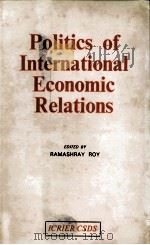《INTERNATIONAL ECONOMIC RELATIONS》
| 作者 | JOHN H.JACKSON 编者 |
|---|---|
| 出版 | WEST PUBLISING CO |
| 参考页数 | 1269 |
| 出版时间 | 1986(求助前请核对) 目录预览 |
| ISBN号 | 0314223096 — 求助条款 |
| PDF编号 | 813694778(仅供预览,未存储实际文件) |
| 求助格式 | 扫描PDF(若分多册发行,每次仅能受理1册) |
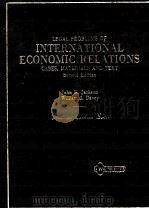
PART Ⅰ. THE LEGAL STRUCTURE OF THE REGULATION OF INTERNATIONAL ECONOMIC RELATIONS2
Chapter 1. The Policies Underlying International Economic Relations2
1.1International Economic Relations and the Law2
1.2 The Growth and Importance of International Trade8
1.3 Economic Theory and International Economic Policy10
1.4 Political Goals and International Economic Policy28
Appendix30
Chapter 2. International Commercial Transactions35
2.1Introduction35
2.2 International Sales Transactions38
2.3 Resolving International Commercial Disputes63
2.4 Problem71
Chapter 3. The United States Constitution and Regulation of International Economic Affairs74
3.1Introduction to Chapters 3 and 474
3.2 The United States Constitution and International Economic Relations77
3.3 International Agreements and U.S. Law112
3.4 Presidential Authority and Trade Legislation in the United States128
3.5 The Courts and Foreign Relations160
3.6 Federal-State Relations and International Economic Regulation169
Chapter 4. National Government Regulation of International Economic Transactions196
4.1Introduction196
4.2 The European Community199
4.3 Japan223
4.4 Nonmarket Economies244
4.5 Developing Countries246
Chapter 5. International Economic Regulation and the Bret-ton Woods System251
5.1Introduction to International Economic Law and Institutions251
5.2 International Law: Role of Custom and Treaties--Individual Rights and State Responsibility258
5.3 Multilateral Economic Treaties and Institutions: The Bretton Woods System270
5.4 The General Agreement on Tariffs and Trade293
5.5 GATT Trade Negotiating Rounds324
5.6 Dispute Resolution and Sanctions in GATT332
5.7 The International Economic Regulatory System Viewed as a Whole: Problems to Consider357
PART Ⅱ. REGULATORY PRINCIPLES AND IMPORT RESTRAINTS: THE CORE OF THE SYSTEM362
Chapter 6. Tariffs, Quotas and Nontariff Barriers362
6.1Introduction362
6.2 National Tariffs and Customs Law369
6.3 GATT and International Tariff Commitments: The Bindings395
6.4 Quotas and Their Application420
Chapter 7. Nondiscrimination and the Most-Favored-Nation Clause428
7.1The Most-Favored-Nation Obligation428
7.2MFN in Operation443
7.3 Customs Unions and Free Trade Areas454
7.4 Preferences and MFN Exceptions464
7.5 The Future of MFN in GATT481
Chapter 8. The National Treatment Clause and Nontariff Barriers483
8.1Introduction483
8.2 The National Treatment Obligation in Operation486
8.3 Exception for National Social and Economic Programs510
8.4 Government Purchases522
8.5 Product Standards and Technical Barriers to Trade532
Chapter 9. Escape Clauses, Safeguards and Adjustment Policies538
9.1Introduction: The Policies and History of Safeguard Measures538
9.2 The Prerequisites and Causal Requirements of an Escape Clause Remedy550
9.3 Remedies and Procedures for Escape Clause Cases591
9.4 Voluntary Restraint Agreements and Special Safeguards Techniques609
9.5 Adjustment Assistance623
9.6 Safeguards and Structural Adjustment: The Puzzle and Prospects for Reform629
Chapter 10. Responses to Unfair Acts in International Trade648
10.1Introduction648
10.2 Dumping and Antidumping Duties653
10.3 Subsidies and Countervailing Duties723
10.4 Additional Remedies for Unfair Trade Practices789
10.5 Retaliation in Trade Policy: Section 301 Actions802
PART Ⅲ. SPECIAL PROBLEMS OF REGULATING INTERNATIONAL ECONOMIC RELATIONS826
Chapter 11. Monetary Affairs and Trade Policy: Operation of the International Monetary Fund826
11.1Introduction826
11.2 Operations of the International Monetary Fund: International Liquidity845
11.3 International and National Regulation of Foreign Exchange Restrictions861
11.4 Trade Measures for Balance of Payments Reasons873
Chapter 12. Export Controls Under GATT and National Law883
12.1Introduction883
12.2 International Regulation of Export Controls887
12.3 United States Export Control Law893
Chapter 13. Trade Controls for National Security and Political Purposes911
13.1Introduction: Historical Background911
13.2 International Rules and National Security and Political Controls on Trade915
13.3 U.S. Trade Controls for National Security Purposes918
13.4 U.S. Trade Controls for Foreign Policy Purposes925
13.5 The Extraterritorial Application of Trade Controls928
13.6 The Effectiveness of Trade Controls Imposed for National Security or Foreign Policy Purposes939
13.7 A Case Study: United Nations Sanctions Against Rhodesia944
13.8 Foreign Use of Trade Controls: U.S. Antiboycott Rules951
Chapter 14. International Trade in Agricultural and Other Commodities953
14.1Introduction953
14.2 Agricultural Products and International Trade Rules955
14.3 Commodities and Commodity Agreements970
14.4 Cartels and Producer Alliances982
Chapter 15. International Trade in Services988
15.1Introduction988
15.2 U.S. Law and Trade in Services992
15.3 Negotiating Rules on International Trade in Services993
15.4 A Case Study: Insurance1008
15.5 International Legal Services1016
Chapter 16. International Regulation of National Controls on International Investment1018
16.1Introduction1018
16.2 National Controls on International Investment1028
16.3 International Regulation of National Controls on International Investment1035
16.4 International Law and Expropriation1039
16.5 Alternatives to Investment: Agents, Distributors and Licensing1044
Chapter 17. Multinational Enterprises1047
17.1Introduction1047
17.2 Codes of Conduct for Multinational Enterprise: The Philosophical Problems1049
17.3 The 1976 OECD Guidelines for Multinational Enterprises1057
Chapter 18. Restrictive Business Practices and International Economic Relations1072
18.1Introduction1072
18.2 The Relationship of Competition and Trade Policies1073
18.3 Application of National Antitrust Laws to International Transactions1077
18.4 International Efforts to Control Restrictive Business Practices1095
Chapter 19. Taxation and International Commerce1101
19.1Introduction1101
19.2 Comparative Tax Burdens and Their Effect on International Trade and Investment1102
19.3 Taxation of Multinational Enterprises1107
19.4 U.S. State Taxation of International Trade and Investment1124
PART Ⅳ. MANAGING WORLD ECONOMIC INTERDEPENDENCE1138
Chapter 20. Developing Countries and the GATT System1138
20.1Introduction1138
20.2 GATT Rules and Developing Countries1140
20.3 The Generalized System of Preferences (GSP)1154
20.4 Initiatives for a "New International Economic Order" (NIEO)1166
20.5 Developing Countries and the International Debt Crisis1171
Chapter 21. Nonmarket Economies, State Trading and International Economic Regulation1174
21.1Trade Between Market and Nonmarket Economies1174
21.2 GATT and Nonmarket Economies: The Problem of Interface1179
21.3 The United States and Communist Countries1187
21.4 Countertrade1195
Chapter 22. Interdependence and the Industrial Market Economies1202
22.1The Problems of Interdependence1202
22.2 Targeting and Industrial Policy1203
22.3 The Houdaille Case1211
22.4 Levels of Barriers to Trade: A Taxonomic Note1215
Chapter 23. Perspectives and Conclusions1220
23.1Reflecting on the Problems Examined in This Book1220
23.2 Legal Rules or Government Discretion梂hich Model Is Best?1221
23.3 Managing Economic Interdependence1241
INDEX1247
1986《INTERNATIONAL ECONOMIC RELATIONS》由于是年代较久的资料都绝版了,几乎不可能购买到实物。如果大家为了学习确实需要,可向博主求助其电子版PDF文件(由JOHN H.JACKSON 1986 WEST PUBLISING CO 出版的版本) 。对合法合规的求助,我会当即受理并将下载地址发送给你。
高度相关资料
-

- U.S.-MEXICO ECONOMIC RELATIONS
- 1979 WESTVIEW PRESS
-
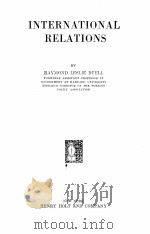
- INTERNATIONAL RELATIONS
- 1925 HENRY HOLT AND COMPANY
-

- TECHNOLOGY AND INTERNATIONAL RELATIONS
- 1979 W.H.FREEMAN AND COMPANY
-

- Refugees and International Relations
- 1989 Oxford University Press
-
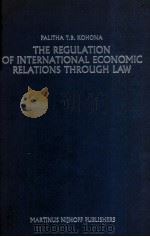
- The regulation of international economic relations through law
- 1985 M. Nijhoff Publishers
-

- INTERNATIONAL RELATIONS
- 1927 NEW YORK THE MACMILLAN COMPANY
-

- ESSENTIALS OF INTERNATIONAL RELATIONS
- 1999 W.W.NORTON & COMPANY
-

- SCIENCE AND INTERNATIONAL RELATIONS
- 1949 SCIENTIFIC PUBLICATIONS
-
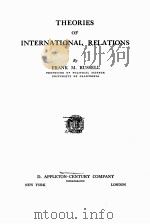
- THEORIES OF INTERNATIONAL RELATIONS
- 1936 D. APPLETON-CENTURY COMPANY
-
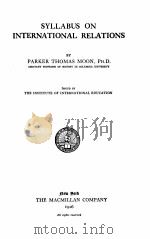
- SYLLABUS ON INTERNATIONAL RELATIONS
- 1926 THE MACMILLAN COMPANY
-

- INDO-CMEA ECONOMIC RELATIONS
- 1987 ASHISH PUBLISHING HOUSE
-

- INTERNATIONAL RELATIONS THIRD EDITION
- 1999 LONGMAN
提示:百度云已更名为百度网盘(百度盘),天翼云盘、微盘下载地址……暂未提供。➥ PDF文字可复制化或转WORD

